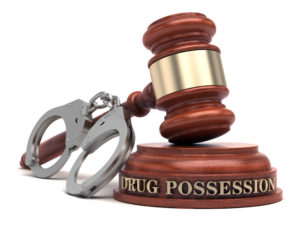
Drug crimes are one of the most common crimes across the state, but the way they are penalized varies based on a number of different factors. The two biggest factors that impact your potential penalties are what drug you were in possession of, and how much of it you had. Below, we take a closer look at the five degrees of drug possession crimes in Minnesota, and explain what drugs will lead you to which charge.
Five Degrees of Drug Possession
Here’s a look at the five degrees of drug possession charges in Minnesota, and what might bring about each charge. We’ll start with the least serious and work our way up to the felony level.
Fifth Degree Drug Possession
Any of the following may constitute a fifth degree drug possession charge:
- Unlawful possession of a Schedule I, II, III or IV controlled substance, except for under 42.5 grams of marijuana.
- Procuring or attempting to procure a controlled substance though deceit or fraud.
Penalties for a fifth degree drug possession charge include the possibility of up to five years in prison and fines up to $10,000.
Fourth Degree Drug Possession
Any of the following may constitute a fourth degree drug possession charge:
- Unlawful possession of 10 or more doses of phencyclicdine or other hallucinogens.
- Unlawful possession of a Schedule I, II or III controlled substance, except marijuana, with the intent to sell the drug.
Penalties for a fourth degree drug possession charge include the possibility of up to 15 years in prison and a fine up to $100,000.
Third Degree Drug Possession
Any of the following may constitute a third degree drug possession charge:
- Unlawful possession of less than six grams of heroin, cocaine, methamphetamine or a combination of thereof.
- Unlawful possession of less than 10 grams of a narcotic other than previously listed.
- Unlawful possession of between 10-50 units of amphetamine, phencyclidene or hallucinogenic substances.
- Unlawful possession of 10 kilograms of marijuana or the equivalent THC concentrate.
Penalties for a third degree drug possession charge include the possibility of up to 20 years in prison and a fine up to $250,000 for a first offense, with penalties increasing for subsequent offenses.
Second Degree Drug Possession
Any of the following may constitute a second degree drug possession charge:
- Unlawful possession of six grams of heroin, cocaine, methamphetamine or a combination thereof.
- Unlawful possession of between 10 and 499 grams of a narcotic other than previously listed.
- Unlawful possession of between 50 and 499 units of amphetamine, phencyclidene or hallucinogenic drugs.
- Unlawful possession of between 10 and 99 kilograms of marijuana or the equivalent in THC concentrate.
Penalties for a second degree drug possession charge include the possibility of up to 25 years in prison and a fine up to $500,000 for a first offense, with penalties increasing for subsequent offenses.
First Degree Drug Possession
Any of the following may constitute a first degree drug possession charge:
- Unlawful possession of more than 25 grams of heroin, cocaine, methamphetamine, or a combination thereof.
- Unlawful possession of more than 500 grams of a narcotic other than previously listed.
- More than 500 units of amphetamine, phencyclidine or hallucinogenic drugs.
- 100 kilograms or more of marijuana or the equivalent in THC concentrate.
Penalties for a first degree drug possession charge include the possibility of up to 30 years in prison and a fine up to $1 million for a first offense, with penalties increasing for subsequent offenses.





